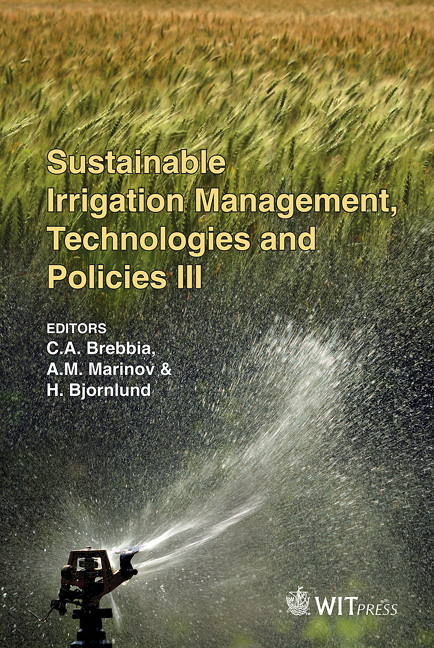Sustainable Irrigation – A New Challenge?
Price
Free (open access)
Transaction
Volume
134
Pages
12
Page Range
165 - 176
Published
2010
Size
306 kb
Paper DOI
10.2495/SI100151
Copyright
WIT Press
Author(s)
V. Bjornlund & H. Bjornlund
Abstract
Irrigation has been practiced for some six or seven thousand years in various parts of the world. When sedentary farming emerged in areas along major rivers in the Fertile Crescent, the Indus Valley and China, irrigation soon followed to sustain food production through dry periods. Many of the areas suitable for irrigation were prone to flooding and therefore canals and other structures were not only needed to supply water for irrigation, but also to drain excess water from the fields, and for flood protection. Such structures were well beyond individual farmers and more complex societies emerged. The term ‘sustainability’ was not known to the first irrigators; they experimented, observed, learned, changed and adapted to their physical environment and changing climate. In some instances, the physical conditions were not suitable for intensive irrigation. Hence, for a number of reasons such as deforestation, soil erosion, salinization and siltation, some hydraulic societies ceased to exist, while in other instances continued for millennia until irrigation intensified due to increased population pressure resulting in changing technologies and practices. In some places irrigation has continued in the same location until today. This paper explores these experiences from around the world and tries to draw lessons for today’s irrigation communities. We find that: decentralizing is better than centralizing; diversity is better than uniformity; and local self-ingenuity and self-reliance yield superior results. If exogenous technologies or knowledge are applied, it should be in conjunction with, and adapted to, local conditions, knowledge and cultures. We also find that many of the mistakes irrigators made thousands of years ago are being repeated today and, consequently, we are suffering the same effects – there seems to be a breakdown in our historical memory. Keywords: sustainable irrigation, Mesopotamia, Egypt, Oman, India.
Keywords
sustainable irrigation, Mesopotamia, Egypt, Oman, India





